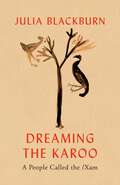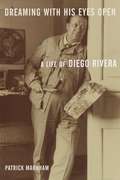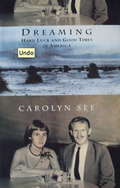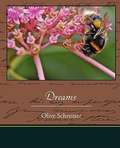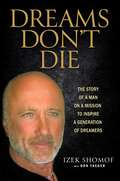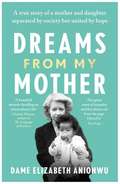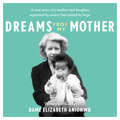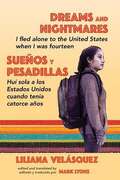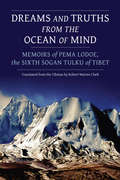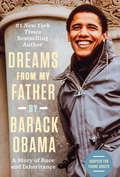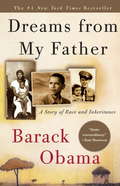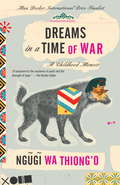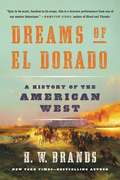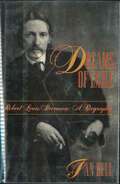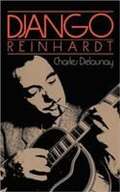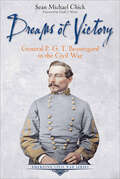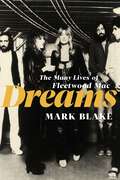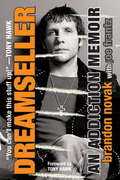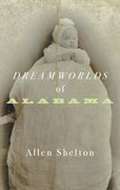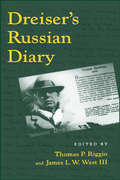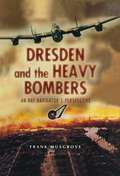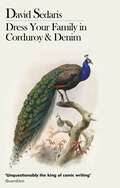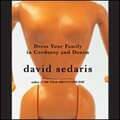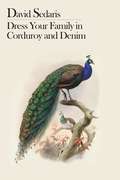- Table View
- List View
Dreaming the Karoo: A People Called the /Xam
by Julia BlackburnA spellbinding new book by the much-acclaimed writer, a journey to South Africa in search of the lost people called the /Xam - a haunting book about the brutality of colonial frontiers and the fate of those they dispossess.In spring 2020, Julia Blackburn travelled to the Karoo region of South Africa to see for herself the ancestral lands that had once belonged to an indigenous group called the /Xam.Throughout the nineteenth century the /Xam were persecuted and denied the right to live in their own territories. In the 1870s, facing cultural extinction, several /Xam individuals agreed to teach their intricate language to a German philologist and his indomitable English sister-in-law. The result was the Bleek-Lloyd Archive: 60,000 notebook pages in which their dreams, memories and beliefs, alongside the traumas of their more recent history, were meticulously recorded word for word. It is an extraordinary document which gives voice to a way of living in the world which we have all but lost. 'All things were once people', the /Xam said.Blackburn's journey to the Karoo was cut short by the outbreak of the global pandemic, but she had gathered enough from reading the archive, seeing the /Xam lands and from talking to anyone and everyone she met along the way, to be able to write this haunting and powerful book, while living her own precarious lockdown life. Dreaming the Karoo is a spellbinding new masterpiece by one of our greatest and most original non-fiction writers.'An astounding, disarming book, full of grief and beauty' Olivia Laing'Blackburn's wise, wonderfully idiosyncratic books are poetic, informed by a...genius for serendipity' Lucy Hughes-Hallett, New Statesman
Dreaming with His Eyes Open: A Life of Diego Rivera
by Patrick MarnhamThis is a comprehensive biography of Diego Rivera, considered one of the finest muralists of the twentieth century. Born in Mexico in 1886, Rivera studied art in Europe for fourteen years and mingled with Picasso and other members of the artistic community in pre-war Paris. He returned to Mexico at the close of the 1910-1920 revolution and secured a series of commissions to paint murals on government and historic buildings. The author explores Rivera's political commitments (a lifelong connection with the Communist Party), his tumultuous relationships with women (he was married four times and had countless mistresses), and his childlike personality beneath the larger-than-life image he projected. Many of Rivera's paintings are described in detail.
Dreaming: Hard Luck and Good Times in America
by Carolyn SeeThe award-winning author of Golden Days and The Rest Is Done With Mirrors now tells her life story and that of her family--one in which heavy drinking and, later, recreational drugs, were something of a family tradition. A fiercely funny and deeply empathetic book which shows that the wild life, for better and worse, has made us what we are.
Dreams
by Olive Schreiner1924. This is the second book by Schreiner, South African author and feminist, who is best remembered for her novel, The Story of an African Farm. It contains eleven short stories based on Schreiner's dreams and life on a farm in South Africa. See other titles by this author available from Kessinger Publishing.
Dreams Don't Die: The Story of a Man on a Mission to Inspire a Generation of Dreamers
by Izek ShomofImmigrant. Dropout. Entrepreneur. Restauranter. Real estate developer. Movie producer. Philanthropist. These are only a few titles Izek Shomof, the so-called King of Spring Street, has carried throughout his fascinating life. Each of these monikers tells a part of Izek&’s unbelievable tale, but the whole story has never been told—until now. Dreams Don&’t Die is not your typical, run-of-the-mill immigrant story. It is the memoir of a man who had every opportunity to take unethical and often-illegal shortcuts but who instead chose the lesser-trod path of honesty and integrity. It&’s the story of a young man who poured his blood, sweat, and tears into the city he loved, transforming not only buildings but lives in the process—starting with his own. From serving drinks in backroom Israeli casinos to buying an entire city block of downtown Los Angeles, Izek&’s life has been anything but traditional. Between flipping burger joints, building tract homes, and renovating historic California high-rises, Izek has come face-to-face with some particularly problematic elements of his family tree—including organized crime, Mob enforcers, hit men, drug cartels, bank robbers, and history-making embezzlement schemes. The sordid adventures of Izek&’s family have even become the subject of not one but two film productions—a major Hollywood motion picture starring James Caan and a blockbuster Israeli documentary series. Izek&’s life proves that even in the face of dream-killing obstacles, with hard work, steadfastness, and tenacity, dreams don&’t have to die.
Dreams From My Mother
by Dame Elizabeth AnionwuWhat a page turner of a book! Dame Elizabeth uncovers the layers of her life from a childhood defined by secrets, to discovering the identity of her father, to her political awakening, and her journey to becoming a Black health radical. She uses her "bellyful of anger" to great effect, highlighting the ethnic health inequalities exposed by sickle cell disease right through to Covid-19. More than anything, her great sense of empathy and fun shine out from the page. I loved it. - DUA LIPA Dreams From My Mother is a beautiful memoir detailing an extraordinary life. Dame Elizabeth Anionwu is a an incredible role model for nurses - and for everyone. - CHRISTIE WATSON, author of The Language of Kindness: A Nurse's StoryWhat a woman. What a book. - LEMN SISSAY OBE, author of My Name Is Why* * *It's 1947 and a sheltered Catholic girl is studying Classics at Newnham College, Cambridge. She is the first one in her family to go to university - and then she discovers that she's pregnant. The father is also a student at Cambridge, studying law. And he is black.Despite pressure to give up her baby for adoption, the young mother has big dreams for her child's future. Her daughter Elizabeth overcomes a background of shame, stigma, and discrimination, to become one of the UK's greatest ever nurses, and the first ever sickle cell nurse specialist. Recently named a BBC 100 Women of the Year 2020 and awarded a Damehood, Dame Elizabeth Anionwu has continued her work throughout her retirement, and recently brought to the nation's attention how Covid-19 has had a devastating effect on Black and Asian communities.Dreams From My Mother is an inspiring story about childhood, race, identity, family, friendship, hope and what makes us who we are. Ultimately, it is an incredibly moving story of a mother and a daughter separated by society, but united in the dreams they shared for her future.Previously published as Mixed Blessings From A Cambridge Union, this is a revised and updated edition* * *This is a powerful and compelling story of dual heritage, how an Irish girl became a Nigerian woman, and how discovering a true and total sense of identity brought acceptance, peace and joy. This story will inspire many people who have Irish and African (and other) roots and should be read by all who are interested in the history and culture of those lands. It is a unique and deeply personal account of the triumph of character, spirit and endeavour in the face of much adversity and considerable bigotry, beautifully written with a complete absence of bitterness. I felt in equal measure humbled and privileged to read it. I never cry but the concluding reflection on the mother and daughter relationship made me cry unashamedly. - PATRICK GAUL, Chair, Liverpool Irish Centre
Dreams From My Mother
by Dame Elizabeth AnionwuWhat a page turner of a book! Dame Elizabeth uncovers the layers of her life from a childhood defined by secrets, to discovering the identity of her father, to her political awakening, and her journey to becoming a Black health radical. She uses her "bellyful of anger" to great effect, highlighting the ethnic health inequalities exposed by sickle cell disease right through to Covid-19. More than anything, her great sense of empathy and fun shine out from the page. I loved it. - DUA LIPA Dreams From My Mother is a beautiful memoir detailing an extraordinary life. Dame Elizabeth Anionwu is a an incredible role model for nurses - and for everyone. - CHRISTIE WATSON, author of The Language of Kindness: A Nurse's StoryWhat a woman. What a book. - LEMN SISSAY OBE, author of My Name Is Why* * *It's 1947 and a sheltered Catholic girl is studying Classics at Newnham College, Cambridge. She is the first one in her family to go to university - and then she discovers that she's pregnant. The father is also a student at Cambridge, studying law. And he is black.Despite pressure to give up her baby for adoption, the young mother has big dreams for her child's future. Her daughter Elizabeth overcomes a background of shame, stigma, and discrimination, to become one of the UK's greatest ever nurses, and the first ever sickle cell nurse specialist. Recently named a BBC 100 Women of the Year 2020 and awarded a Damehood, Dame Elizabeth Anionwu has continued her work throughout her retirement, and recently brought to the nation's attention how Covid-19 has had a devastating effect on Black and Asian communities.Dreams From My Mother is an inspiring story about childhood, race, identity, family, friendship, hope and what makes us who we are. Ultimately, it is an incredibly moving story of a mother and a daughter separated by society, but united in the dreams they shared for her future.Previously published as Mixed Blessings From A Cambridge Union, this is a revised and updated edition* * *This is a powerful and compelling story of dual heritage, how an Irish girl became a Nigerian woman, and how discovering a true and total sense of identity brought acceptance, peace and joy. This story will inspire many people who have Irish and African (and other) roots and should be read by all who are interested in the history and culture of those lands. It is a unique and deeply personal account of the triumph of character, spirit and endeavour in the face of much adversity and considerable bigotry, beautifully written with a complete absence of bitterness. I felt in equal measure humbled and privileged to read it. I never cry but the concluding reflection on the mother and daughter relationship made me cry unashamedly. - PATRICK GAUL, Chair, Liverpool Irish Centre
Dreams From My Mother
by Dame Elizabeth AnionwuWhat a page turner of a book! Dame Elizabeth uncovers the layers of her life from a childhood defined by secrets, to discovering the identity of her father, to her political awakening, and her journey to becoming a Black health radical. She uses her "bellyful of anger" to great effect, highlighting the ethnic health inequalities exposed by sickle cell disease right through to Covid-19. More than anything, her great sense of empathy and fun shine out from the page. I loved it. - DUA LIPA Dreams From My Mother is a beautiful memoir detailing an extraordinary life. Dame Elizabeth Anionwu is a an incredible role model for nurses - and for everyone. - CHRISTIE WATSON, author of The Language of Kindness: A Nurse's StoryWhat a woman. What a book. - LEMN SISSAY OBE, author of My Name Is Why* * *It's 1947 and a sheltered Catholic girl is studying Classics at Newnham College, Cambridge. She is the first one in her family to go to university - and then she discovers that she's pregnant. The father is also a student at Cambridge, studying law. And he is black.Despite pressure to give up her baby for adoption, the young mother has big dreams for her child's future. Her daughter Elizabeth overcomes a background of shame, stigma, and discrimination, to become one of the UK's greatest ever nurses, and the first ever sickle cell nurse specialist. Recently named a BBC 100 Women of the Year 2020 and awarded a Damehood, Dame Elizabeth Anionwu has continued her work throughout her retirement, and recently brought to the nation's attention how Covid-19 has had a devastating effect on Black and Asian communities.Dreams From My Mother is an inspiring story about childhood, race, identity, family, friendship, hope and what makes us who we are. Ultimately, it is an incredibly moving story of a mother and a daughter separated by society, but united in the dreams they shared for her future.Previously published as Mixed Blessings From A Cambridge Union, this is a revised and updated edition* * *This is a powerful and compelling story of dual heritage, how an Irish girl became a Nigerian woman, and how discovering a true and total sense of identity brought acceptance, peace and joy. This story will inspire many people who have Irish and African (and other) roots and should be read by all who are interested in the history and culture of those lands. It is a unique and deeply personal account of the triumph of character, spirit and endeavour in the face of much adversity and considerable bigotry, beautifully written with a complete absence of bitterness. I felt in equal measure humbled and privileged to read it. I never cry but the concluding reflection on the mother and daughter relationship made me cry unashamedly. - PATRICK GAUL, Chair, Liverpool Irish Centre
Dreams and Nightmares/Sueños y Pesadillas: I Fled Alone To The United States When I Was Fourteen (Working And Writing For Change Ser.)
by Liliana VelasquezAt fourteen, Liliana Velásquez walked out of her village in Guatemala and headed for the U.S. border, alone. On her two-thousand-mile voyage she was robbed by narcos, rode the boxcars of La Bestia, and encountered death in the Sonoran Desert. When she was caught by Immigration in Arizona, she thought her journey was over. But it had just begun. A los catorce años, Liliana abandonó su pueblo en Guatemala y se dirigió hacia la frontera de los Estados Unidos, sola. En su viaje de dos mil millas fue asaltada por los narcos, viajó en los vagones de La Bestia y se enfrentó a la muerte en el desierto de Sonora. Cuando fue capturada por Inmigración en Arizona, ella pensó que su viaje había terminado. Pero solo acababa de empezar.
Dreams and Truths from the Ocean of Mind: Memoirs of Pema Lodoe, the Sixth Sogan Tulku of Tibet
by Pema LodoeA Tibetan lama tells his life story, from childhood with nomadic parents to his entrance into a monastic community, participation in Buddhist retreats, recognition as a reincarnated lama, meeting with the present Fourteenth Dalai Lama of Tibet, and study and training in the Dzogchen tradition of Buddhism for service as a teacher to the world--based for the last ten years in California.Sogan Rinpoche's account of his life evokes the beauty of the Tibetan land and people and their unique Dharma culture. It also bears witness to the destruction and oppression of Tibetan culture by the communist colonialism of the government of the People's Republic of China, while inspiring us with the survival in extremity of Buddhist ethics and education. He describes his beloved Golok homeland in the northeast Tibetan region of Amdo, now carved up into Chinese provinces.He vividly evokes the wisdom and kindness of his parents and grandmother, and of his extraordinary teachers who survived harsh treatment in the Chinese gulags. His unflinching description of the harsh cruelty of the Chinese invaders of Tibet forces us to confront the reality of senseless, amoral actions of people driven by delusive convictions and emotions, while his ability to still appreciate the humanness of Tibet's enemies reflects the generous and tolerant Tibetan spirit. Finally, his detailed and sensitive sharing of his remarkable process of inner development allows us to witness how human beings can stretch themselves to encompass truly challenging teachings and practices and emerge with open eyes and open heart, while maintaining humility and positive intentions.His memoir is aptly titled Dreams and Truths, as the dreamlike quality of his many trials and sorrows as well as moments of joy is apparent from his most youthful encounters with death and suffering. He thus exemplifies for us the Buddhist vision of how realistically to remain in this world as a compassionate positive participant without being of this world as caught up in the desperate and futile struggle to live selfishly and unrealistically focused on one's own little agenda rather than on the vast need of all one's fellow beings.The "truths" that he shares are the deep, experiential Buddha teachings, especially the exquisite, expansive wisdom view and compassionate practice and ethic of the Nyingma Dzogchen tradition, in its rigorously nonsectarian form. His adventures show us how one can meet even mundane challenges all the more effectively by actually renouncing selfish concerns.Without showing off, he honestly and poetically shows us how we can take advantage of darkest adversity and turn it into golden opportunity. In his life and work he honors his noble teachers, including his kindest patron, the Fourteenth Dalai Lama of Tibet.
Dreams from My Father (Adapted for Young Adults): A Story of Race and Inheritance
by Barack ObamaNow adapted for young adults—the #1 New York Times bestselling memoir, which Toni Morrison called &“quite extraordinary,&” offers an intimate look at Barack Obama&’s early days. This is a compelling journey tracing the future 44th president's odyssey through family, race, and identity. A revealing portrait of a young Black man asking questions about self-discovery and belonging—long before he became one of the most important voices in America. This unique edition includes a new introduction from the author, full-color photo insert, and family tree. The son of a white American mother and a Black Kenyan father, Obama was born in Hawaii, where he lived until he was six years old, when he moved with his mother and stepfather to Indonesia. At twelve, he returned to Hawaii to live with his grandparents. Obama brings readers along as he faces the challenges of high school and college, living in New York, becoming a community organizer in Chicago, and traveling to Kenya. Through these experiences, he forms an enduring commitment to leadership and justice. Told through the lens of his relationships with his family—the mother and grandparents who raised him, the father he knows more as a myth than as a man, and the extended family in Kenya he meets for the first time—Obama confronts the complicated truth of his father&’s life and legacy and comes to embrace his divided heritage. On his journey to adulthood from a humble background, he forges his own path through trial and error while staying connected to his roots. Barack Obama is determined to lead a life of purpose, service, and authenticity. This powerful memoir will inspire readers to examine both where they come from and where they are capable of going.
Dreams from My Father: A Story of Race and Inheritance (Canons #54)
by Barack ObamaIn this lyrical, unsentimental, and compelling memoir, the son of a black African father and a white American mother searches for a workable meaning to his life as a black American. It begins in New York, where Barack Obama learns that his father--a figure he knows more as a myth than as a man--has been killed in a car accident. This sudden death inspires an emotional odyssey--first to a small town in Kansas, from which he retraces the migration of his mother's family to Hawaii, and then to Kenya, where he meets the African side of his family, confronts the bitter truth of his father's life, and at last reconciles his divided inheritance. Pictured in lefthand photograph on cover: Habiba Akumu Hussein and Barack Obama, Sr. (President Obama's paternal grandmother and his father as a young boy). Pictured in righthand photograph on cover: Stanley Dunham and Ann Dunham (President Obama's maternal grandfather and his mother as a young girl). From the Trade Paperback edition.
Dreams in a Time of War: A Childhood Memoir
by Ngugi Wa Thiong’oBy the world-renowned novelist, playwright, critic, and author of Wizard of the Crow, an evocative and affecting memoir of childhood. Ngugi wa Thiong'o was born in 1938 in rural Kenya to a father whose four wives bore him more than a score of children. The man who would become one of Africa's leading writers was the fifth child of the third wife. Even as World War II affected the lives of Africans under British colonial rule in particularly unexpected ways, Ngugi spent his childhood as very much the apple of his mother's eye before attending school to slake what was then considered a bizarre thirst for learning. In Dreams in a Time of War, Ngugi deftly etches a bygone era, capturing the landscape, the people, and their culture; the social and political vicissitudes of life under colonialism and war; and the troubled relationship between an emerging Christianized middle class and the rural poor. And he shows how the Mau Mau armed struggle for Kenya's independence against the British informed not only his own life but also the lives of those closest to him. Dreams in a Time of War speaks to the human right to dream even in the worst of times. It abounds in delicate and powerful subtleties and complexities that are movingly told.From the Hardcover edition.
Dreams of El Dorado: A History of the American West
by H. W. BrandsFrom a New York Times-bestselling author, a sweeping history of the American West In Dreams of El Dorado, H. W. Brands tells the thrilling, panoramic story of the settling of the American West. He takes us from John Jacob Astor's fur trading outpost in Oregon to the Texas Revolution, from the California gold rush to the Oklahoma land rush. He shows how the migrants' dreams drove them to feats of courage and perseverance that put their stay-at-home cousins to shame-and how those same dreams also drove them to outrageous acts of violence against indigenous peoples and one another. The West was where riches would reward the miner's persistence, the cattleman's courage, the railroad man's enterprise; but El Dorado was at least as elusive in the West as it ever was in the East.Balanced, authoritative, and masterfully told, Dreams of El Dorado sets a new standard for histories of the American West.
Dreams of Exile: Robert Louis Stevenson: A Biography
by Ian Bell"Fiction is to grown men what play is to the child," Robert Louis Stevenson once said in a statement that perfectly captures the magic of his own fiction. Immensely popular during is brief life--he died in 1894 at the age of forty-four--he has never lacked for readers since. In the century that followed his death, many biographies have been written, each with its own R.L.S.: the sickly, dreaming child; the Bohemian dandy outraging Victorian Edinburgh; the romantic wanderer leading his donkey through the wilds of the Cevennes; the frail genius doomed to die young. For some, he is the man of action avid for experience, filled with wanderlust; for others, the writer of stories beloved by children and familiar from innumerable film ad television dramas. Still others know him as the essayist whose skills matched William Hazlitt's and the novelist to whom even Henry James deffered. All of these are R.L.S., but none is the full Stevenson.Now, in this new and acclaimed biography, Ian Bell attempts to see Stevenson whole, to trace the line of descent form the son of Calvinist engineers to the man who ended his days as Tusitala among the Samoan islanders. Understanding that for Stevenson geography mattered, Bell sets out to discover the complete man through the places he lived and the people he lived among as well as through the books that poured from him during his all-too-short literary life. As such, Dreams of Exile is both literary biogrpahy and travel narrative. It follows Stevenson's development as an artist and as a man by following his often chaotic progress from continent to continent, in good health and in bad, in poverty and in wealth. Along the way, it reveals his often tortured relations with his family, his robust sexuality, and the mystery of his stormy marriage to a woman many years his senior. But perhaps Bell's most important contribution is to rescue R.L.S. from the many conflicting and often romanticized images that have continued to surround him, and in the process to make a telling case for Stevenson's genius as a writer.
Dreams of Trespass: Tales of a Harem Girlhood
by Fatima MernissiThis rich, magical and absorbing growing-up tale set in a little-known culture reflects many universals about women. The setting is a "domestic harem"in the 1940s city of Fez, where an extended family arrangement keeps the women mostly apart from society, as opposed to the more stereotypical "imperial harem," which historically provided sex for sultans and other powerful court officials. Moroccan sociologist Mernissi ( Islam and Democracy ) charts the changing social and political frontiers and limns the personalities and quirks of her world. Here she tells of a grandmother who warns that the world is unfair to women, learns of the confusing WW II via radio news in Arabic and French, watches family members debate what children should hear, wonders why American soldiers' skin doesn't reflect Moroccan-style racial mixing and decides that sensuality must be a part of women's liberation. With much folk wisdom--happiness, the author's mother told her, "was when there was a balance between what you gave and what you took"--this book not only tells a winning personal story but also helps to feminize a much-stereotyped religion.
Dreams of Victory: General P. G. T. Beauregard in the Civil War
by Sean Michael ChickFew Civil War generals attracted as much debate and controversy as Pierre Gustav Toutant Beauregard. P. G. T. combined brilliance and charisma with arrogance and histrionics. He was a Catholic Creole in a society dominated by white Protestants, which made him appear exotic next to the likes of Albert Sidney Johnston and Robert E. Lee. He was reviled by Jefferson Davis and often mocked by Mary Chesnut in her diary. Yet, he was popular with his soldiers and subordinates. Outside of Lee, he was the South’s most consistently successful commander, winning at Bull Run, defending Charleston in 1863, and defeating Benjamin Butler at Bermuda Hundred and Ulysses Grant and George Meade at Petersburg. Yet, he lived his life in the shadow of his one major defeat: Shiloh. Beauregard’s career before and after the war was no less tumultuous than his Civil War record. He was born among the Creole elite of Louisiana, but rejected the life of a planter in favor of the military, inspired by tales of Napoléon. He was considered a shining light of the antebellum army and performed superbly in the Mexican-American War. Yet, he complained about a lack of promotion and made a frustrating stab at being mayor of New Orleans in 1858. After the war, he was a successful railroad executive and took a stand against racism, violence, and corruption during the Reconstruction. Yet, he was ousted from both railroads he oversaw and his foray into Reconstruction politics came to naught. Although he provided for his family and left them a hefty sum after his death, the money was mostly gained by working for the corrupt Louisiana Lottery. In Dreams of Victory: General P. G. T. Beauregard in the Civil War, Sean Michael Chick explores a life of contradictions and dreams unrealized—the first real hero of the Confederacy who sometimes proved to be his own worst enemy.
Dreams: The Many Lives of Fleetwood Mac
by Mark BlakeAn illuminating deep-dive into everything Fleetwood Mac—the songs, the rivalries, the successes, and the failures—Dreams evokes the band's entire musical catalog as well as the complex human drama at the heart of the Fleetwood Mac story.Fleetwood Mac has had a ground-breaking career spanning over fifty years and includes some of the best-selling albums and greatest hits of the twentieth and twenty-first centuries. But the band&’s unique story is one of enormous triumph and also deep tragedy. There has never been a band in the history of music riven with as much romantic drama, sexual tension, and incredible highs and lows as Fleetwood Mac. Dreams is a must-read for casual Fleetwood Mac fans and die-hard devotees alike. Presenting mini-biographies, observations, and essays, Mark Blake explores all eras of the Fleetwood Mac story to explore what it is that has made them one of the most successful bands in history. Blake draws on his own exclusive interviews with Mick Fleetwood, Stevie Nicks, Lindsey Buckingham, and the late Peter Green and Christine McVie, and addresses the complex human drama at the heart of the Fleetwood Mac story, including the complicated relationships between the band's main members, but he also dives deep into the towering discography that the band has built over the past half-century.
Dreamseller: An Addiction Memoir
by Brandon Novak Joseph Frantz“Skate, drugs, and rock ‘n’ roll!”—Kat Von D, LA InkForward by Tony HawkSkateboarder and Jackass star Brandon Novak comes clean about his crazy rise to fame, tailspin into addiction, and other death-defying stunts on the road to recovery...At seven, Brandon was a skateboard prodigy. By the time he was fourteen, he was living the dream. Discovered by skate legends Bucky Lasek and Tony Hawk. Touring the U.S. with the elite Powell-Peralta team. Signing autographs and appearing in films and magazines. Brandon had it all. Then he got hooked on heroin.Soon the up-and-coming star was living a down-and-out life in a garage, begging for change, and hustling to score his next fix. He stole from his family and friends. He pushed the fantasy that everything was okay, that he was going to rehab, getting help, and getting better. But it was all a lie.This is the story of an addict—a dreamseller who stopped believing the lies he was selling and started believing in himself. With the help of his celebrity buddy Bam Margera of Jackass fame, Brandon joined the cast of MTV’s Viva La Bam and made an honest reach for sobriety. The road was hard, and he had some falls. But like any great skateboarder, Brandon Novak was always determined to get up again . . . “Entertaining, shocking, crazy, unimaginable.”—Bam MargeraWith 24 pages of photos
Dreamworlds of Alabama
by Allen SheltonWisteria draped on a soldier’s coffin, sent home to Alabama from a Virginia battlefield. The oldest standing house in the county, painted gray and flanked by a pecan orchard. A black steel fence tool, now perched atop a pile of books like a prehistoric bird of prey. In Dreamworlds of Alabama, Allen Shelton explores physical, historical, and social landscapes of northeastern Alabama. His homeplace near the Appalachian foothills provides the setting for a rich examination of cultural practices, a place where the language of place and things resonates with as much vitality and emotional urgency as the language of humans. Throughout the book, Shelton demonstrates how deeply culture is inscribed in the land and in the most intimate spaces of the person—places of belonging and loss, insight and memory. Born and raised in Jacksonville, Alabama, Allen Shelton is associate professor of sociology at Buffalo State College.
Dreiser's Russian Diary
by Theodore Dreiser James L. West III Thomas P. RiggioTheodore Dreiser's Russian Diary is an extended record of the American writer's travels throughout the Soviet Union in 1927-28. Dreiser was initially invited to Moscow for a week-long observance of the tenth anniversary of the October Revolution. He asked, and was granted, permission to make an extended tour of the country.This previously unpublished diary is a firsthand record of life in the USSR during the 1920s as seen by a leading American cultural figure. It is a valuable primary source, surely among the last from this period of modern history.
Dresden and the Heavy Bombers: An RAF Navigator's Perspective
by Frank MusgroveThis is the story of a young man's entry into the war in 1941 and culminates in his flying on the bombing raid to Dresden in February 1945. This is not a gung-ho account of flying with Bomber Command but neither is it a breast-beating avowal of guilt. These memoirs take the form of a basic narrative of the author's RAF career and pay particular attention to fear, morale and, as the author explains, the myth of leadership. Several raids are described in detail and illustrate the variety of experience, problems and dangers involved in such hazardous warfare. So, nearly 60 years after his dramatic experiences, how does he view the bombing of factories and cities and the inevitable grave moral issues that have slowly and insidiously crept up on him ? The answer will surprise many younger and older readers.
Dress Your Family In Corduroy And Denim
by David Sedaris'No one has a turn of phrase like David Sedaris. This series of essays about his life and family is a joy from start to finish' Adam KayDavid Sedaris plays in the snow with his sisters.He goes on vacation with his family.He gets a job selling drinks.He attends his brother's wedding.He mops his sister's floor.He gives directions to a lost traveller.He eats a hamburger.He has his blood sugar tested.It all sounds so normal, doesn't it?In his new book David Sedaris lifts the corner of ordinary life, revealing the absurdity teeming below its surface. His world is alive with obscure desires and hidden motives - a world where forgiveness is automatic and an argument can be the highest form of love. Dress Your Family in Corduroy and Denim finds one of the wittiest and most original writers at work today at the peak of his form.
Dress Your Family In Corduroy And Denim
by David SedarisNo one renders the pathos, chaos, and impossible variety of daily encounters like David Sedaris. On every subject, he is bruisingly painful and tenderly affectionate. Sedaris is unique in American writing, and these readings of his own work are highly skilled performances. This new collection will be eagerly anticipated by his ever-growing crowd of devoted fans.
Dress Your Family in Corduroy and Denim
by David SedarisDavid Sedaris plays in the snow with his sisters. He goes on vacation with his family. He gets a job selling drinks. He attends his brother's wedding. He mops his sister's floor. He gives directions to a lost traveler. He eats a hamburger. He has his blood sugar tested. It all sounds so normal, doesn't it? In his newest collection of essays, David Sedaris lifts the corner of ordinary life, revealing the absurdity teeming below its surface. His world is alive with obscure desires and hidden motives-- a world where forgiveness is automatic and an argument can be the highest form of love. Dress Your Family in Corduroy and Denim is another unforgettable collection from one of the wittiest and most original writers at work today.
